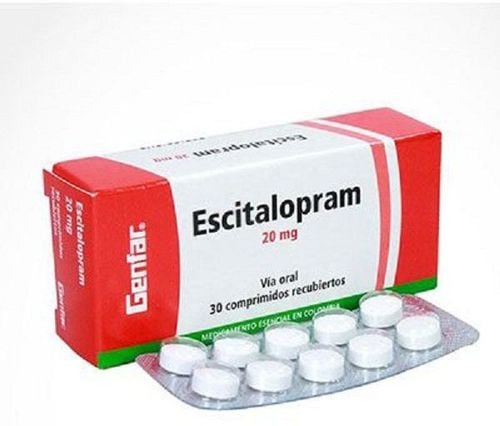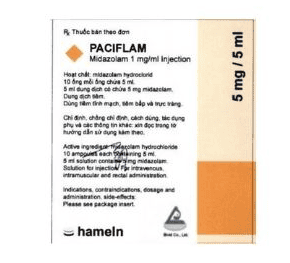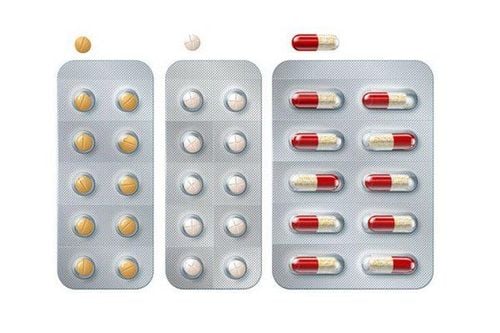This is an automatically translated article.
Zolotan medicine containing the active ingredient Zolpidem tartrate is indicated in the short-term treatment of insomnia in patients with depression and anxiety... Let's learn about the uses and dosage of Zolotan through the article below.
1. Uses of Zolotan
Zolotan contains the active ingredient Zolpidem, which is prepared in the form of film-coated tablets with two strengths, Zolpidem 5mg and 10mg. The active ingredient Zolpidem belongs to the group of imidazopyridine-derivative tranquilizers with short duration of action, different chemical structure from benzodiazepines, barbiturates, but similar effects to benzodiazepines. However, unlike benzodiazepines, Zolpidem has very little anxiolytic, anticonvulsant and muscle relaxant effects.Zolotan is indicated in the short-term treatment of insomnia causing anxiety and depression in patients.
2. Dosage of Zolotan
Zolotan is taken before going to bed, the patient should take it at the same time of day. Some recommendations on the dosage of Zolotan are as follows:
Adults: It is recommended to take Zolotan 10 orally 1 tablet before going to bed. Where necessary, higher doses can be used, however high doses of the drug can lead to an increased risk of unwanted effects, including the potential for abuse; Elderly, debilitated patients: It is recommended to take Zolotan 5 to take 1 tablet before going to bed, the dose can be adjusted when necessary; Patients with renal failure, liver failure: It is recommended to use Zolotan 5mg orally 1 tablet before going to bed, the dose can be adjusted as needed. It is not recommended to use Zolpidem more than 10mg/day and only for a short time (no more than 7-10 days). The dose should be reduced in patients receiving concomitant medications with potential CNS depressants due to the increased risk of undesirable effects.
Safety and effectiveness of Zolpidem in children under 18 years of age have not been established, so it should not be used in this population.
3. Zolotan side effects
Zolotan may cause some unwanted effects as follows:
Common: Headache, dizziness, drowsiness, weakness, anxiety, diarrhea, sweating, constipation, indigestion, boredom eating, joint pain, loss of coordination; Uncommon: Psychosis, paresthesia, migraine, anorexia, neuralgia, cerebral palsy, neuritis, tremor, difficulty speaking, taste disturbance, cough, flatulence, cramps, bronchitis management; Rare: Insomnia, hallucinations, suicidal tendencies, sciatica, convulsions, anaphylaxis, photosensitivity, skin allergy, intestinal obstruction, rectal bleeding, epistaxis, weakness muscle, bronchospasm, tendonitis, hypotension, elevated liver enzymes. Patients should inform their doctor if they experience any unwanted effects while taking Zolotan.
4. Note when using Zolotan
Contraindicated to use Zolotan in the following cases:
Patients with hypersensitivity to Zolpidem or any component of Zolotan; People with sleep apnea; Patients with muscle weakness; People with liver failure, severe kidney failure; Patients with acute respiratory failure or severe respiratory failure; Pregnant women, lactating women. Precautions when using the drug:
Caution should be taken when using Zolotan in patients with impaired respiratory function, because the drug has the potential to cause respiratory depression. Patients should be reminded not to drink alcohol or take CNS depressants while being treated with Zolotan because of increased CNS side effects. Use caution when using Zolotan in the elderly, people with impaired liver and kidney function, patients with a history of drug addiction, people with depression. Avoid prolonged use of Zolotan. In case of drug treatment for 1-2 weeks or more, it is necessary to gradually reduce the dose until stopping to avoid the risk of withdrawal syndrome. Zolotan can cause drowsiness, so it is recommended not to drive or operate machinery while taking this medicine. Store Zolotan at room temperature, away from sunlight and high humidity.
5. Drug interactions
The concentration of Zolpidem in the blood increases when used simultaneously with the antifungal drug Azol (Floconazole, Ketoconazole...), thereby increasing the effect and increasing the risk of unwanted effects of Zolotan. Rifampicin metabolizes the enzyme P450 34A, thereby reducing plasma concentrations and reducing the effect of Zolotan when used in combination. Ritinavir and other drugs in the group inhibit the metabolism of Zolpidem, leading to increased sedation and respiratory depression. Therefore, it is not recommended to use these drugs concurrently. Serotonin reuptake inhibitors (Paroxetin, Fluoxetin...) inhibit metabolism and increase the effect of Zolotan. Drug interactions occur that increase the risk of having an effect and reduce the therapeutic effect of Zolotan. Therefore, to ensure safety and effectiveness in treatment, patients need to inform their doctors about the drugs and foods they are using before taking Zolotan.
In summary, Zolotan is indicated in the short-term treatment of insomnia causing anxiety and depression in patients. To ensure safety for your health and maximize the effectiveness of your treatment, you need to take Zolotan exactly as directed by your doctor.
Please dial HOTLINE for more information or register for an appointment HERE. Download MyVinmec app to make appointments faster and to manage your bookings easily.













